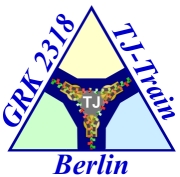
DFG Research Training Group "TJ-Train" (GRK 2318/2)
Tight junctions and their proteins
Molecular features and actions in health and disease
Project C4
 1st period 1st period
 2nd period 2nd period
Priv.-Doz.
Dr. Nina Hering1

 , Priv.-Doz. Dr.
Hans-Jörg Epple2 , Priv.-Doz. Dr.
Hans-Jörg Epple2


1Dept. Surgery,
Campus Benjamin Franklin, Charité - Universitätsmedizin Berlin
2Charité Outpatient Health Center, Infectiology
and Hepatology
The role of glucagon-like peptide-2 for macromolecule uptake and immune activation in HIV enteropathy
Background Causing increased translocation of microbial components into the systemic circulation, a barrier defect of the gut epithelium is currently considered a key mechanisms of HIV
immunopathogenesis. However, despite its assumed prominent role for HIV pathogenesis, an epithelial barrier defect for microbial macromolecules has not been characterized in the intestinal mucosa
of HIV-infected individuals so far.
Aims Combining clinical data with functional, molecular and immunological analyses of mucosal samples obtained from HIV-infected patients and HIV-negative controls and with data obtained in
cell culture models, our project aims to characterize macromolecule translocation across the intestinal mucosa in HIV infection, define the route of macromolecule translocation, identify its
trigger mechanism and compare small and large intestinal mucosa in these respects.
Methods Methods employed will be: (i) Electrophysiological and transport physiological analysis of epithelial macromolecular transport and barrier function, (ii) immunofluorescence and
confocal microscopy, (iii) cell culture, (iv), quantification of epithelial protein expression and apoptosis by standard assays, (v) subset analysis of mucosal immune cells and quantification of
mucosal cytokine patterns by immunohistochemistry, flow cytometry, and cytometric bead array.
3rd cohort PhD doctoral student
Alain Massarani


-
Masete KV, Massarani AS, Schulzke JD, Epple HJ*, Hering NA* (*shared last authorship) (2025)
Tumour necrosis factor-α induces macromolecule translocation in HIV-derived duodenal organoids.
Front Immunol.
16: 1563702 (12 pages). doi: 10.3389/fimmu.2025.1563702
(°IF 5.9)
2nd cohort PhD doctoral student
Valerie Masete


-
Masete KV, Massarani AS, Schulzke JD, Epple HJ*, Hering NA* (*shared last authorship) (2025)
Tumour necrosis factor-α induces macromolecule translocation in HIV-derived duodenal organoids.
Front Immunol.
16: 1563702 (12 pages). doi: 10.3389/fimmu.2025.1563702
(°IF 5.9)
-
Masete KV, Günzel D, Schulzke JD,
Epple HJ*, Hering NA* (*shared last authorship) (2025) Matrix-free human 2D organoids
recapitulate duodenal barrier and transport properties. BMC Biol. 23(1): 2
(13 pages).
doi: 10.1186/s12915-024-02105-7 (°IF 4.5)
1st cohort PhD doctoral student
Carolin Grünhagen

-
Krug SM, Grünhagen C, Allers K, Bojarski C, Seybold J, Schneider T, Schulzke JD, Epple HJ (2023) Macromolecule translocation across
the intestinal mucosa of HIV-infected patients by transcytosis and through apoptotic leaks. Cells
12(14): 1887 (13 pages). doi: 10.3390/cells12141887
(IF 5.1)
1st cohort MD doctoral student
Hannah Lutz

Participation with project
C4
Priv.-Doz. Dr. Susanne M. Krug


Project-related publications
-
Allers K, Puyskens A, Epple HJ, Schürmann D, Hofmann J, Moos V,
Schneider T (2016) The effect of timing of antiretroviral therapy on CD4+ T cell reconstitution in the intestine of HIV-infected patients.
Mucosal Immunol.
9: 265-274
-
Epple HJ, Schneider T, Zeitz M (2015) Microbial translocation and the effects of HIV/SIV infection on mucosal
barrier function. In:
Mucosal Immunology, 4th
edn. Mestecky J, Strober W, Kelsall B, Lambrecht B, Russell M, Cheroutre H (Eds.), Elsevier Academic Press, Burlington, San Diego, London
-
Allers K, Bösel D, Epple HJ, Karcher H, Schmidt W, Kunkel D, Geelhaar-Karsch A, Schinnerling K, Moos V, Schneider T
(2014) Effect of age on the CD4+ T cell impairment in HIV-infected persons without and with cART.
J. Acquir. Immune Defic. Syndr.
66: 7-15
-
Allers K, Fehr M, Conrad K, Epple HJ, Schürmann D, Geelhaar-Karsch A, Schinnerling K, Moos V, Schneider T
(2014) Macrophages accumulate in the gut mucosa of untreated HIV-infected patients.
J. Infect. Dis.
209: 739-748
-
Epple HJ, Zeitz M (2012) HIV infection and the intestinal mucosal barrier.
Ann. N. Y. Acad. Sci.
1258: 19-24
-
Allers K, Loddenkemper C, Hofmann J, Unbehaun A, Kunkel D, Moos V, Kaup FJ, Stahl-Hennig C, Epple HJ, Schneider T
(2010) Gut mucosal FOXP3+ regulatory CD4+ T cells and non-regulatory CD4+ T cells are differentially affected by SIV infection in rhesus macaques.
J. Virol. 84: 3259-3269
-
Epple HJ, Allers K, Troeger H, Kuhl A, Erben U, Fromm M, Zeitz M, Loddenkemper C, Schulzke JD, Schneider T
(2010) Acute HIV infection induces mucosal infiltration with CD4+ and CD8+ T cells, epithelial apoptosis, and a mucosal barrier defect.
Gastroenterology
139: 1289-1300
-
Epple HJ, Schneider T, Troeger H, Kunkel D, Allers K, Moos V, Amasheh M, Loddenkemper C, Fromm M, Zeitz M,
Schulzke JD (2009) Impairment of the intestinal barrier is evident in untreated but absent in suppressively treated HIV-infected patients.
Gut
58: 202-207
-
Schulbin H, Bode H, Stocker H, Schmidt W, Zippel T, Loddenkemper C, Engelmann E, Epple HJ, Arastéh K, Zeitz M, Ullrich R
(2008) Cytokine expression in the colonic mucosa of HIV-infected individuals before and during nine months of antiretroviral therapy.
Antimicrob. Agents Chemother.
52: 3377-3384
-
Epple HJ, Loddenkemper C, Kunkel D, Troeger H, Maul J, Moos V, Berg E, Ullrich R, Schulzke JD, Stein H, Duchmann R,
Zeitz M, Schneider T (2006) Mucosal but not peripheral FOXP3+ regulatory T cells are highly increased in untreated HIV infection and normalize after suppressive HAART.
Blood
108: 3072-3078
|
